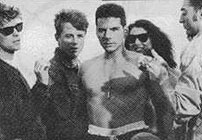|
|
|
|
Lie
Down with Dogs
|
 |
|
Wally White's gay comedy Lie Down with Dogs is a delight. In many respects it is a male version of Rose Troche's sweet, lesbian confection, Go Fish (1994). Troche's film, an unexpected success around the world, helped galvanise what is being touted as a niche market for queer cinema of all stripes. I confess that such marketing acclaim makes me a little queasy. These days, in the era of cable television, electronic publishing and new multi-cinema complexes opening seemingly every second week, we are obsessed with niche markets and target audiences. The argument runs that various subcultural social groups, whose interests and tastes are under-represented in mainstream media, can now find product tailor-made and packaged just for them. But if niche markets are like new channels, they also resemble prisons or ghettos. The parcelling up of the filmgoing market into a thousand discrete, already rigidly defined little groups perfectly follows the logic of capitalist consumerism: divide and conquer. It also suits the reigning attitude of majority, conservative groups – the attitude that weirdos can do as they please as long as they politely hide it away from the mass, public eye. It is great that more gay films are now being made for gay audiences. But what about also creating and multiplying the chances for other viewers – either straight, not-yet-gay, or anywhere in-between – to encounter a world and a culture about which they may know very little? A supposed crossover film such as the lame The Adventures of Priscilla, Queen of the Desert (1994) is very far from representing any version of a gay sensibility. Meanwhile, Lie Down with Dogs – which is a genuine and energetic expression of an aspect of queer experience – lands in its Melbourne niche market, a single arthouse cinema. It will be a great pity if this does not attract an audience wider than its designated target group. For writer-director-star White effortlessly locates the universal appeal of his story without sacrificing any of the specificity of its gay milieu. Like many a flamboyant teen movie, Lie Down with Dogs is about an interlude, a crazy summer in the life of its hero Tommie (White). He skips the urban grind of New York for the veritable gay retreat of Princetown – as the director describes it, "a small American town turned gay". P-town (as it is popularly known) is a sunny, rambling procession of cafés, bars, beaches and guest houses – and a perfect place to fall in love. This is an earthy film, but also a shamelessly romantic one. That is the secret of its appeal. Like Go Fish it is dedicated to fun and rapture – a bearable lightness of being, in contradistinction to the gloom and dread that marked the '80s. Indeed, Tommie's friend Guy (Bash Halow) attends a wild party in P-town which he calls "the beginning of the '90s, at last". Where Troche's film emulated the poetic lyricism of Jean Vigo (L'Atalante, 1934), White's feature debut is closer to the pop zest of John Hughes' teen comedies. As in Hughes' Ferris Bueller's Day Off (1986), Tommie engages our attention by rapping directly into camera – even while he is being vigorously humped off-screen by his intense Latino lover, Tom (Randy Becker). In one hilarious sequence early on, White imagines representatives from various groups within the gay community (radical, lesbian, Afro-American) screaming for his film to be boycotted – because it expresses a white, middle-class, apolitical fantasy of gay love in a privileged world apart. But there is, ultimately, a fine political message to be imbibed here. I believe that both Go Fish and Lie Down with Dogs are utopian films in the best sense. These filmmakers know full well that the threat of AIDS, the struggle for gay identity, and the violent repressions practised by straight society have not yet disappeared. They choose, however, to set aside an embattled, paranoid or fatalistic mind-set, and instead offer a precious, against-all-odds optimism. With Lie Down with Dogs, the result of such a tactic is a movie that should buoy anyone's heart. MORE queer cinema: My Summer of Love, Poison, Like It Is © Adrian Martin November 1995 |
![]()